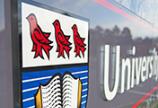UVic to provide Indigenous students from US with domestic tuition rates
UVic has approved a regulatory amendment that grants Indigenous students from the US, whose ancestral lands extend into Canada, to be assessed under domestic, rather than international, tuition classification.
When you peer into Canada’s colonial history, UVic’s most recent effort to honour the Truth and Reconciliation Commission’s Calls to Action becomes more relevant.
The Jay Treaty, signed between Britain and the United States in November 1794 and officially known as the Treaty of Amity, Commerce and Navigation, contains a provision intended to allow Indigenous people from the territory of Canada to live and work freely in the US. The Government of Canada has never formally recognized the pre-Confederation reciprocal provision as binding, according to the Canadian Encyclopedia.
The spirit of the Jay Treaty
Now, UVic and other BC universities, such as UBC and VIU, are proceeding in the spirit of the Jay Treaty to increase post-secondary accessibility for Indigenous students.
“I’m excited that Indigenous students from the United States who study at UVic will now pay domestic tuition rates. Colonial policies by both the Canadian and American governments created artificial boundaries that did not recognize our ongoing relationships,” says Robina Thomas, executive director, Indigenous Academic and Community Engagement. “These policies were exasperated by other federal policies such as residential schools and the Sixties Scoop that resulted in further separation and displacement of Indigenous families and communities on both side of these borders.”
The Office of the Registrar brought forward the proposal for the tuition fees reclassification after conducting preliminary research last spring. It aligns with UVic’s strategic enrollment management plan, which has a key institutional goal of increasing Indigenous student representation from six per cent to 10 per cent of overall enrollment by 2029. The addition to UVic’s Regulations for Tuition Fees for Graduate Programs and Undergraduate and Other Fees provisions, recently approved by the Board of Governors, is effective starting January 2020.
“This is an integral part of the university’s ongoing work to honour the Truth and Reconciliation Commission’s Calls to Action and aligns with many strategic priorities by reducing obstacles and increasing accessibility to higher education for Indigenous students,” says Wendy Taylor, acting registrar.
Acknowledging Indigenous heritage and territories
The revisions mean UVic’s tuition structure respects and acknowledges Indigenous heritage and territories, irrespective of the Canada-US border. The changes will be published in the January 2020 editions of both the graduate and undergraduate calendars.
The amendments also provide the domestic tuition benefit for survivors of the “Sixties Scoop,” so called in reference to the mass removal of Indigenous children from their families into the child welfare system from the 1950s to 1980s. A number of US families adopted “Sixties Scoop” Indigenous children from Canada.
Among the revisions is a strategy to work with the Office of Indigenous Academic and Community Engagement (IACE) to implement internal practices to facilitate campus-wide collaboration opportunities for Indigenous students, enhance organizational effectiveness and promote a sense of shared enterprise and meaningful purpose. This aligns with the Strategic Framework’s goals to cultivate an extraordinary academic environment, foster respect and reconciliation and engage locally and globally.
UVic’s new tuition policy is a positive step towards reconciliation as it acknowledges that the traditional territories of Indigenous peoples are not defined by these artificial borders created by colonial governments.
—Executive director, Indigenous Academic and Community Engagement, Robina Thomas
Under the tuition initiative, students can bring supporting documentation to the Office of the Registrar starting in January to have their fees updated, effective that term. Any requests for backdating would be on a case-by-case basis. The registrar’s office is also working on a plan to provide details of the initiative to First Nations communities whose territories overlap the border.

